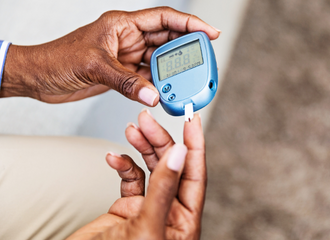If you or a loved one is dealing with diabulimia, we’re here to help. This page will provide guidance on symptoms, treatment paths and information on what to do next.
What Is Diabulimia?
The term “diabulimia” is clinically known as ED-DMT1 or eating disorder with type 1 diabetes. It is a life-threatening condition in which there is intentional manipulation of insulin (medication) for the purpose of weight loss or to prevent weight gain. Diabulimia can affect individuals of all ages, races and genders and can cause serious medical problems related to continued elevated blood glucose in the body, possibly turning fatal.
Emotional Characteristics of Diabulimia
Individuals with diabulimia are often preoccupied with weight and can act secretively. Emotionally, they may experience intense fear of weight gain, guilt, shame, anxiety, and depression, and often suffer from a distorted body image. Social isolation and impaired daily functioning are common, both of which can negatively impact academic and work performance in addition to overall well-being.
Diabulimia Warning Signs
Diabulimia is highly dangerous and life threatening. It can cause serious medical consequences. Symptoms and early signs can include both physical and behavioral indicators.
Key signs that you or someone you know may be struggling with diabulimia include:
- Significant weight fluctuations/loss
- Constant fatigue
- Frequent episodes of Diabetic Ketoacidosis (DKA)
- Poorly “controlled” diabetes
- Body image concerns
- Unexplained repeatedly high blood glucose
- Obsessive reading of food labels
- Increased thirst and urination
- Frequent infections
- Blurred vision
Is It Really an Eating Disorder?
We live in a culture with rigid ideals about food, weight and size, so it can be difficult to recognize when your thoughts and behaviors have become dangerous. Take a quiz and find out.
Diabulimia Treatment & Levels of Care
The treatment of an eating disorder coupled with type 1 diabetes requires a coordinated care approach, including an endocrinologist, diabetes educator/dietitian and support system. Recovery from diabulimia is much more than simply stopping insulin manipulation – it involves exploring the emotional factors that contribute to maintenance of the eating disorder symptoms and poor diabetes management.
Someone living with type 1 diabetes has the constant pressure to maintain a specific blood glucose level which often leads to a preoccupation around food and numbers to ensure appropriate calculations. Many patients attribute taking insulin with weight gain, which is often the precursor to developing ED-DMT1.
Our treatment philosophy starts with finding the approach that best matches your or your loved ones’ needs.
Residential Treatment
Continuous in-person treatment. Often the most structured and intensive level of care.
Day Treatment
Comprehensive and consistent outpatient care with daily, in-person meetings.
Intensive Outpatient (IOP)
Intensive structure and treatment plans with consistent meetings several days per week.
Outpatient Services
Weekly structure and steady support, but provided at a slower pace than IOP.
Virtual Treatment
The same structured, intensive care of in-person, delivered virtually.
How to Help Someone with Diabulimia
Early intervention is key if you or someone you know is suffering from diabulimia. Seeking medical attention will help in minimizing your risk for complications. Encourage them to talk with someone they trust about the behaviors – either a physician, counselor or support person. It can be difficult to take the steps to set up a professional evaluation, however, as a support person, you can listen and encourage them to seek treatment. For helpful information and guidance, explore our library of dedicated resources, podcast episodes, and blogs on eating disorder topics.
Reach out to a Renfrew Program Information Specialist to schedule a FREE assessment or to learn more about our services.

Diabulimia FAQ
What is diabulimia?
Diabulimia is an eating disorder where individuals with type 1 diabetes deliberately reduce or omit insulin to lose weight, leading to serious health risks due to uncontrolled blood sugar levels.
How common is diabulimia?
Diabulimia is relatively common among individuals with type 1 diabetes, particularly in adolescents and young adults, with some studies suggesting that up to 40% of women with type 1 diabetes engage in insulin manipulation.
Are there specific types of diabulimia?
While there are no specific subtypes, diabulimia can vary in severity and pattern, including occasional insulin omission or more chronic and severe insulin restriction, often accompanied by other disordered eating behaviors.
What causes diabulimia?
Causes of diabulimia include a complex interplay of psychological factors (such as body image issues and fear of weight gain), societal pressures, underlying mental health conditions, and the demanding nature of diabetes management.
What are the most common signs for diabulimia?
Common signs include rapid weight loss, frequent high blood sugar levels, recurrent diabetic ketoacidosis, fatigue, changes in mood, excessive thirst, frequent urination, preoccupation with body image, secretive behavior regarding insulin use, and avoidance of medical appointments.
How do I know if I need treatment for diabulimia?
If you or someone you love is intentionally skipping or reducing insulin doses to lose weight, it’s crucial to seek support from both medical and mental health providers. Other signs may include significant weight loss, uncontrolled blood sugar levels, frequent hospitalizations, emotional distress, or other disordered behaviors, such as restricting food, purging, or binge eating. Early intervention can prevent serious health complications and support long term recovery.
What should I do if I’m curious about treatment?
Research your options. Review websites and social media accounts of treatment centers to get a feel for the treatment approach to make sure it is a good fit. Discuss with your support system including your outpatient providers if you have them. Submit inquiries to treatment centers you would like to connect with and schedule an assessment. Our Program Information Specialists offer confidential phone calls to provide education about our services, answer your questions and address your concerns: Call 1-800-RENFREW (736-3739). Certain diabetes-related complications, such as excessive thirst, frequent urination, stomach pain, nausea and vomiting may require immediate medical attention.
What forms of treatment are most effective for diabulimia?
Diabulimia is a complex psychiatric disorder that rarely travels alone. An effective treatment approach will ideally include a multidisciplinary team that works together to target multiple factors, including the eating disorder symptoms, diabetes education & management, nutritional deficiencies, medical complications, and any co-occurring mental health diagnoses. A comprehensive eating disorder assessment is recommended to identify your needs and choose the appropriate level of care.
What is Renfrew’s Treatment Approach for diabulimia?
The Renfrew Center provides treatment for Diabulimia through a multidisciplinary team of therapists, dietitians, medical providers, and psychiatrists. The Renfrew Center’s Unified Treatment Model for Eating Disorders® is a transdiagnostic, evidenced based approach designed to improve awareness of the emotional patterns that have led to disordered eating or poor diabetes management. A phased approach to diabetes care is designed to provide more accountability and support to reach individualized blood sugar goals. This approach also harnesses the healing power of relational connection and targets the core mechanisms that maintain disordered cycles and co-occurring emotional disorders.
What is the role of a treatment team in diabulimia recovery?
The treatment team supports and collaborates with each client, assesses the severity of the eating disorder symptoms, and monitors progress in the recovery process. They make recommendations and provide individualized treatment interventions to meet their client’s psychological, medical, and nutritional needs. Support systems and outpatient providers might also be part of the treatment team to promote sustainable change outside of the treatment setting.
What is the long-term outlook for someone with diabulimia?
Early intervention and the appropriate level of care can make a significant difference in the long-term recovery of those with Diabulimia. Due to the complex nature of the disorder, it will not likely resolve on its own or with time. Seeking out the appropriate level of care as soon as possible is recommended for best outcomes.
What can I do to support someone struggling?
We recommend that loved ones educate themselves on eating disorders and diabetes, as well as seek guidance from professionals when possible. It is important to note that eating disorders are not ‘fads’ or ‘phases’ and should not be ignored or dismissed. Family and friends should approach their loved one with compassion and concern and take steps to involve professionals, including a physician as soon as possible.
Reach Out to Us
Talk with a Program Information Specialist at the number above to learn more about our
services and to schedule an assessment. Or, fill out the information below and we will contact you.






